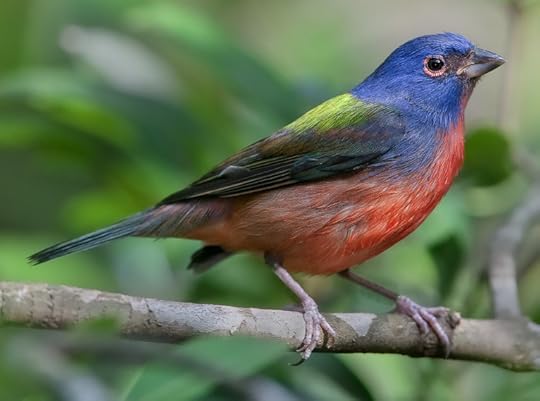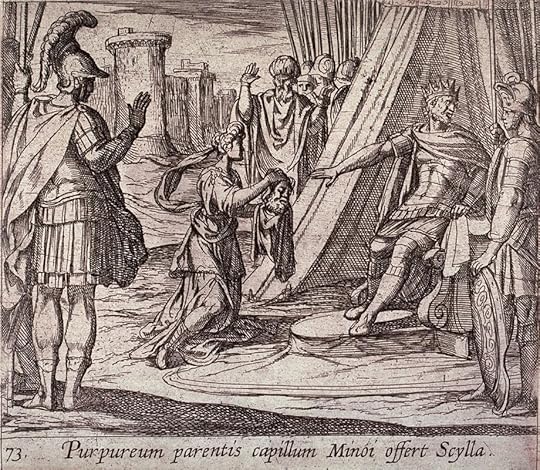 Kalliope’s
Comments
(group member since Aug 28, 2018)
Kalliope’s
Comments
(group member since Aug 28, 2018)
Kalliope’s
comments
from the Ovid's Metamorphoses and Further Metamorphoses group.
Showing 121-140 of 610
 And here is Monteverdi's 'Lamento d'Arianna' - 'Lasciatemi morire'.
And here is Monteverdi's 'Lamento d'Arianna' - 'Lasciatemi morire'.https://www.youtube.com/watch?v=LARI9...
I like Antonacci. I have one recording of Rodelinda with her.
Below a better recording, with Von Otter, and the score.
https://www.youtube.com/watch?v=DyJy6...
 I have been a bit disappointed with the Minotaur, Theseus in Crete, Ariadna and her abandonment in Dia (I always thought it was in Naxos, and that is probably the case in other versions), and the arrival of Bacchus... A sequence of stories I have always loved..May be because of the very famous Titian and the beautiful piece by Monteverdi.
I have been a bit disappointed with the Minotaur, Theseus in Crete, Ariadna and her abandonment in Dia (I always thought it was in Naxos, and that is probably the case in other versions), and the arrival of Bacchus... A sequence of stories I have always loved..May be because of the very famous Titian and the beautiful piece by Monteverdi.Titian. Bacchus and Ariadne. 1520-1523. London National Gallery.

This was one of the paintings for the 'studiolo' of Alfonso d'Este, Duke of Ferrara.
It shows Ariadna distraught as she sees Theseus's ship in the distance, leaving her... just at the moment when Bacchus (Liber in this section of Ovid's text) arrives with his retinue.
When we discussed Bacchus in Book 3 (his birth and his arrival in the Pentheus scene) I was tempted to post this image, since the description of his retinue seemed to correspond to that part of the text, but waited until now. Titian seems to have conflated scenes.
In the sky one can see the 'crown of stars' that Bacchus has hurled into the sky.
 Roman Clodia wrote: "Did we all notice the way Ovid's description of the Cretan labyrinth also applies to his own labyrinthine poetry? ..."
Roman Clodia wrote: "Did we all notice the way Ovid's description of the Cretan labyrinth also applies to his own labyrinthine poetry? ..."Haha.. very true.. We need Ariadna to help us go through the maze.
 Historygirl wrote: "Roman Clodia wrote: "Kalliope wrote: "The notion of Scylla as a Trojan horse is very appealing. I read the Illiad years ago.. may be I will have to revisit it. "
Historygirl wrote: "Roman Clodia wrote: "Kalliope wrote: "The notion of Scylla as a Trojan horse is very appealing. I read the Illiad years ago.. may be I will have to revisit it. "The Trojan horse isn't in the Ilia..."
In Simpson it does not mention the head, it says: what I give you now is not simply a lock of hair, but my father's life.
And then in the notes it clarifies that the Latin 'caput', although it literally means 'head', it is a metonymy meting 'life' - but that Ovid's chose of words forces us to image the bleeding head of Nisus rather than the lock of hair... as if though Scylla had scalped her father and presented Minos with the scalp.
Not surprising then to see Tempesta's interpretation.
 I looked up the bird CIRIS, with the purple head.
I looked up the bird CIRIS, with the purple head.Many personalities become birds, but in this case she is denied earth and sea - only the air remains.
It is beautiful bird, though.

 In her rage, and after reminding us of the Europa & Jupiter episode, Scylla then digs at Pasiphaë, with again a bull (with whom she begot the Minotaur). I wonder if her story is told at greater length further on.
In her rage, and after reminding us of the Europa & Jupiter episode, Scylla then digs at Pasiphaë, with again a bull (with whom she begot the Minotaur). I wonder if her story is told at greater length further on.From Wiki:
Pasiphae was the daughter of Helios, the Sun, and Perse, of the Oceanids. Like her doublet Europa, her origins were in the East, in her case at Colchis; she was the sister of Circe, Aeëtes and Perses, and she was given in marriage to King Minos of Crete. With Minos, she was the mother of Acacallis, Ariadne, Androgeus, Glaucus, Deucalion, Phaedra, Xenodice, and Catreus. After a curse from Poseidon, Pasiphae experienced lust for and mated with a white bull sent by Poseidon.
In the Greek literalistic understanding of a Minoan myth, in order to actually copulate with the bull, she had the Athenian artificer Daedalus construct a portable wooden cow with a cowhide covering, within which she was able to satisfy her strong desire.
This explains the 'wooden contraption' that Scylla mentions.
 I have been looking to see if any piece of music has been composed in honour to the MEGARA musical walls, but I have not found anything.
I have been looking to see if any piece of music has been composed in honour to the MEGARA musical walls, but I have not found anything.Anyone?
 Jim wrote: "Perhaps recognizing that some lighter fare was in order after the violence, bloodshed and familial vengeance of the Calydon Boar, Ovid follows up with a couple of gentle narratives. The piety, kind..."
Jim wrote: "Perhaps recognizing that some lighter fare was in order after the violence, bloodshed and familial vengeance of the Calydon Boar, Ovid follows up with a couple of gentle narratives. The piety, kind..."Wonderful find, Jim... I will look for it.. Great photo.
 Desirae wrote: "In Book Eight, hunger is the driving force of both realms; it’s evident and cannot be ignored due to a myriad of reasons.
Desirae wrote: "In Book Eight, hunger is the driving force of both realms; it’s evident and cannot be ignored due to a myriad of reasons.King Minos’s bid for vengeance comes to a close with his conquest of Alcat..."
I echo Elena in thanking you for the summary. The continuous shifts in viewpoint make me feel as if I had been transformed into a bird too..!!!
 Historygirl wrote: "I am finding Book 8 just as difficult as Book 7, if not more so. Theseus kind of ghosts through it. Lots of people turn into birds. Ovid is certainly picking up the pace, not relaxing it. Seriously..."
Historygirl wrote: "I am finding Book 8 just as difficult as Book 7, if not more so. Theseus kind of ghosts through it. Lots of people turn into birds. Ovid is certainly picking up the pace, not relaxing it. Seriously..."I have just finished my first (and fast) reading of Book 8, and the latter part has somewhat lost me. I hope to get a better grip in my second visit.
 Beth wrote: "I have read book 8, but have nothing to add for now -- just here to say that yes, The Aeneid is great and you should read it! I remember the Trojan Horse."
Beth wrote: "I have read book 8, but have nothing to add for now -- just here to say that yes, The Aeneid is great and you should read it! I remember the Trojan Horse."Yes, I plan to read the Aeneid soon after the Met. Thank you for cheering me along, Beth.
 Roman Clodia wrote: "It's odd in the Tempesta above that it shows Scylla with Nisus' head, not just the 'magic' lock of hair. Did he read the text and deliberately exacerbate her crime for visual effect?"
Roman Clodia wrote: "It's odd in the Tempesta above that it shows Scylla with Nisus' head, not just the 'magic' lock of hair. Did he read the text and deliberately exacerbate her crime for visual effect?"Yes, I had a similar thought... I wonder if he had to deal with the notion that showing just the hair would not make it clear enough for the viewers who were not familiarised enough with the story.
 I obviously have to reread it. I am mixing my memories (not many) with the overall general knowledge we all have of the Trojan War.
I obviously have to reread it. I am mixing my memories (not many) with the overall general knowledge we all have of the Trojan War. I have not read the Aeneid. Now I realize I ought to have read it before Ovid. Hope to remedy this gap soonish.
 I have not found paintings on the Scylla/Minos/Nisus -- but may be Peter will.
I have not found paintings on the Scylla/Minos/Nisus -- but may be Peter will. There are engravings, though... obviously coming from illustrations included in the Ovid editions.
Antonio Tempesta.

Below a link to wiki's index of Tempesta's illustrations of the Metamorphoses.
https://commons.wikimedia.org/wiki/Ca...
 My notes clarify that there were two Scyllas. One is the daughter of King Nisus of Megara (the one in this chapter) and the other is the sea monster who was stationed opposite Charybdis (from the Odyssey), but Ovid mixes them up here. It seems that in his 'Amores' Ovid noted 'that it is we poets who have conflated the two Scyllas.
My notes clarify that there were two Scyllas. One is the daughter of King Nisus of Megara (the one in this chapter) and the other is the sea monster who was stationed opposite Charybdis (from the Odyssey), but Ovid mixes them up here. It seems that in his 'Amores' Ovid noted 'that it is we poets who have conflated the two Scyllas.
 I had forgotten that Minos was Europa's son.
I had forgotten that Minos was Europa's son.On Tuesday I was at a lecture in which Titian's, Rubens' and Velazquez's paintings were discussed, and Ovid's text was quoted.
 Jim wrote: "The Scylla-Minos-Nicus melodrama strikes me as ideal material for a dramatic opera, the sort of stuff that was bread and butter for bel canto composers such as Bellini or Rossini. And yet, as far a..."
Jim wrote: "The Scylla-Minos-Nicus melodrama strikes me as ideal material for a dramatic opera, the sort of stuff that was bread and butter for bel canto composers such as Bellini or Rossini. And yet, as far a..."From what I know, Rossini and the Bel Canto composers such as Donizetti and Bellini were not too attracted to classical subjects, but you are right in that the emotions call for a 19C opera with strong passions.
In fact, on Tuesday I watched the broadcasted La Forza del Destino, from the ROH, and the theme there is again a young woman having to chose between her father and her beloved. Verdi's opera shows a very different way of going about it and a different outcome, but the inner doubts and the opposing emotional pull are similar.
 Roman Clodia wrote: "Scylla and Minos
Roman Clodia wrote: "Scylla and MinosWe're in 'heroic' territory in this book, it seems, where epic themes of the heroic and erotic seem to intertwine. Less emphasis on the gods or the 'love of the gods' typology.
..."
I have now read this section, and have enjoyed your comments, RC. In effect, another soliloquy. Again by a female.. I don't know about the rest but are the women the only ones who engage in this self-analysis, or may be this inner doubts.
The notion of Scylla as a Trojan horse is very appealing. I read the Illiad years ago.. may be I will have to revisit it.
 Roman Clodia wrote: "Kalliope wrote: "Ovid's presentation of this myth has surprised me because he just made a very passing comment on what I think is the most famous episode of her complicated life. "
Roman Clodia wrote: "Kalliope wrote: "Ovid's presentation of this myth has surprised me because he just made a very passing comment on what I think is the most famous episode of her complicated life. "Ha - that's ver..."
Haha yes.. very Ovidian in it omission.
Thank you for the Medea book, RC...


